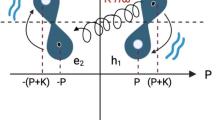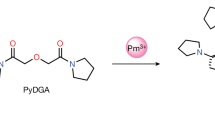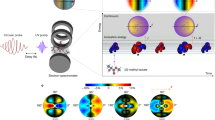Abstract
A SUMMARY of the results of an experimental research concerning the formation of negative ions from electrons may prove of interest. The electrons were generated by means of light emitted from a quartz mercury vapour lamp (‘Home Sun’ D.C. type) and incident upon a gold-plated electrode distant 2 cm. from a similar electrode. Between these two electrodes an alternating potential difference of ‘square’ wave form was established. During a fraction (f) of the time of a complete cycle the electric carriers advance to the receiving electrode; in the remainder of the cycle their motion is reversed, and they are withdrawn from the gas. The gas contained in the measuring vessel was air at various pressures; no purification of the air was attempted other than careful drying.
This is a preview of subscription content, access via your institution
Access options
Subscribe to this journal
Receive 51 print issues and online access
$199.00 per year
only $3.90 per issue
Buy this article
- Purchase on Springer Link
- Instant access to full article PDF
Prices may be subject to local taxes which are calculated during checkout
Similar content being viewed by others
Author information
Authors and Affiliations
Rights and permissions
About this article
Cite this article
WELLISH, E. Photoelectrons and Negative Ions. Nature 128, 547–548 (1931). https://doi.org/10.1038/128547a0
Issue Date:
DOI: https://doi.org/10.1038/128547a0
This article is cited by
-
Photoelectrons and Negative Ions
Nature (1932)
-
Photoelectrons and Negative Ions
Nature (1931)
Comments
By submitting a comment you agree to abide by our Terms and Community Guidelines. If you find something abusive or that does not comply with our terms or guidelines please flag it as inappropriate.



